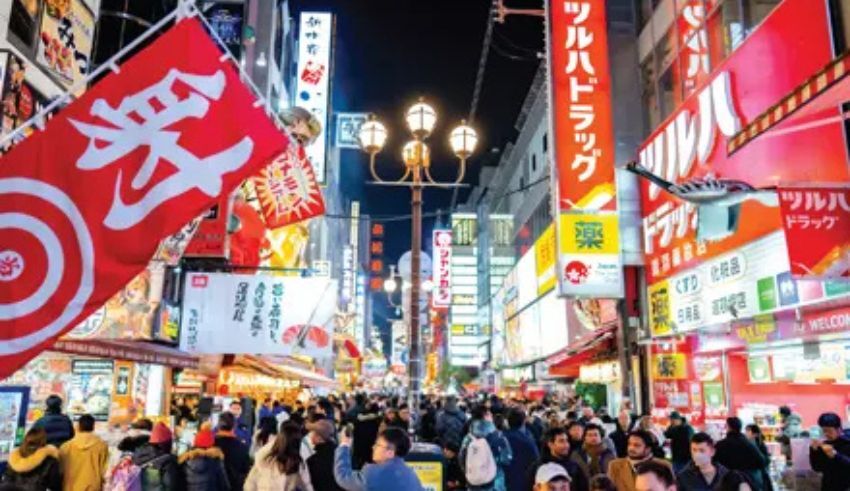
With a slew of events sparking indignation on social media, foreign nationals in Japan have lately attracted more unwanted attention. Many residents are complaining about what they believe to be impolite and stupid behavior of tourists. These crimes range from petty transgressions to more severe crimes, which fuels increasing conflict between immigrants and the native Japanese people.
The long and concerning list of crimes carried out by foreign citizens Wide-ranging criticism has been directed against a recent incident involving a 60-year-old American visitor detained for graffiti at Tokyo’s famous Meiji Jingu shrine. One of the most treasured spiritual locations in Japan, the shrine has been vandalized, shocking both residents and visitors. The American, who apparently referred to the graffiti as a “prank,” now confronts criticism not only from the general public but also from long-term foreign residents demoralized by his behavior.
Other events have transpired, aggravating the negative view of immigrants. Four Sri Lankans were recently questioned in relation to the 220 car heist in Japan, which heightened already mounting worries about foreign criminality. A British guy is connected to a 13 million yen (US$83,200) theft; a Chinese woman was charged with running an illegal brothel. The matter got worse when a Chilean woman was seen performing pull-ups on a holy “torii” gate of a shrine. Such actions, which are seen as extremely rude in Japanese society, have stoked popular indignation.
Growing Reversal Among Residents, Both Foreign and Native
The bad media coverage and social media indignation around these events are profoundly affecting the relationships between foreigners and the Japanese populace. Although the majority of the acts were carried out by visitors, long-term foreign residents are feeling the consequences since they fear that these transgressions will cause generalizations about foreigners in Japan. Such behavior could compromise the goodwill expats have developed over years, therefore influencing their personal life as well as their career prospects.
French national Eric Fior, who has spent 25 years living in Japan and operates an education company in Yokohama, voiced his annoyance over the Meiji Jingu graffiti incident. He underlined that his choice to live in Japan was mostly motivated by the rich cultural legacy of the nation and that the acts of visitors such as Americans disappointed him much.
“Reading about the American tourist who graffitized Meiji Jingu infuriated me,” Fior stated. “Part of the reason I choose to stay here is the history and culture all around us; then, we learn about a visitor doing this at one of the most well-known and significant temples in Japan. Whose behavior like that? he asked.
This incredulity has gone around social media as foreign citizens express worries about the rising tendency of misbehavior among guests. Steve Hayes, the 65-year-old American detained for vandalism, has drawn criticism from many who demand harsh penalties for his deeds. “People like Steve leave me deeply ashamed, shaking my head in disbelief,” a visitor wrote on the Japan Today website.
Keep Reading
The knock-on effects of tourist behavior on Japan’s image
Rising misbehavior among foreign citizens is not only damaging the reputation of individual visitors but also starting to tarnish Japan’s general image. The events are starting to be extensively covered both locally and abroad, which might seriously compromise Japan’s reputation as a friendly and safe place for visitors and foreigners both equally.
Furthermore, such behavior might affect Japan’s future tourist policy direction. Concerns over rising tourist management and foreign behavior could lead the Japanese government to tighten rules and monitor foreign visitors especially at cultural and holy sites like Meiji Jingu. This could eventually make it more difficult for well-meaning visitors to come, therefore aggravating the relationship between Japan and its foreign guests.
Public opinion is greatly shaped by social media, hence in Japan it has become a main forum for both native people and immigrants to voice their unhappiness. Posts calling out the people accountable for these events have driven the current wave of criticism; many Japanese people express their worries on Twitter, Facebook, and other internet sites.
Many of the foreign Japanese residents, who are active on social media, have also used similar channels to separate themselves from the activities of the offenders. By doing this, they seek to maintain their respect in Japan and reassure residents that such behavior does not reflect the larger international population. But as more and more misbehavior events come to light, it gets harder to keep a difference between the acts of a small number and the impression of the whole foreign community.
The rising discontent with foreign behavior in Japan emphasizes the need for cultural sensitivity and respect for local norms. Travelers to Japan should be informed of the value of the locations they go to and the need of treating holy sites with the dignity they so merit. This covers knowing the cultural standards of behavior at historical sites, shrines, and temples. Ignoring this could have major effects not only for the individual engaged but also for the larger international society.
Moreover, visitors and foreigners should deliberately try to learn about the rich customs and values of Japan to prevent unintentionally upsetting residents. Although Japan is well-known for its friendliness to outsiders, persistent disobedience could result in tougher rules meant to damage its image as a tolerant nation.
In the end, the negative focus on foreign people living in Japan emphasizes the need for more cultural knowledge, respect, and accountability. The countless expats and visitors who benefit Japanese society should not be overshadowed by the activities of a few individuals. Working together will help both residents and visitors to foster mutual understanding and respect, therefore preventing long-standing divisions resulting from these events.
Learning about local customs, history, and culture will not only be polite for individuals living in or visiting Japan but also help to create a harmonic and respectful surroundings for all those engaged.




